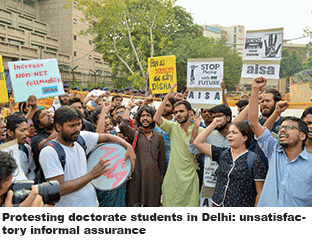 Despite some of india’s modern multi-disciplinary universities having been established 170 years ago, for several decades until this year when the Indian Institute of Science, Bangalore and IIT-Delhi were ranked #147 and #179 in the QS World University Rankings 2015, not a single one among them had figured in the Top 200 annual league tables published by QS (Quacquarelli Symonds) and Times Higher Education (THE). And the consensus of informed opinion is that the abysmal rankings awarded to Indian institutions of higher education is because of their neglect of research and new knowledge creation.
Despite some of india’s modern multi-disciplinary universities having been established 170 years ago, for several decades until this year when the Indian Institute of Science, Bangalore and IIT-Delhi were ranked #147 and #179 in the QS World University Rankings 2015, not a single one among them had figured in the Top 200 annual league tables published by QS (Quacquarelli Symonds) and Times Higher Education (THE). And the consensus of informed opinion is that the abysmal rankings awarded to Indian institutions of higher education is because of their neglect of research and new knowledge creation.
In a belated response to sustained criticism, on October 28 the Union ministry of human resource development (HRD) announced the appointment of a five-member review committee to “review ways to encourage and expand quality research in diverse fields”.
A ministry press release says that it will examine a proposal to “issue fellowships for research students”, even to those who have not cleared the National Eligibility Test or NET — the qualifying exam for entry level appointment as assistant professor in Central universities. The review committee has been asked to submit its report to the HRD ministry by the end of this year.
The formation of the review committee is the HRD ministry’s response to strident protests organised by research (M.Phil, Ph D) students against an October 7 notice issued by the Delhi-based University Grants Commission (UGC) scrapping fellowship grants to research students without NET clearance. In 2006, in an initiative to stimulate research activity in universities, UGC had sanctioned modest fellowship grants of Rs.5,000-8,000 per month to all research students enrolled in Central universities. Those who cleared NET are entitled to larger monthly grants of Rs.25,000-35,000.
On October 19, 700 doctoral students from several Central varsities including Jawaharlal Nehru University, Delhi University, and Jamia Millia Islamia camped all night before the UGC headquarters in Delhi in an ‘Occupy UGC’ protest, for which they were detained by the Delhi police. This evoked an informal assurance from HRD minister Smriti Irani who tweeted “non-NET fellowships will not be discontinued,” on October 26.
However, research scholars, who receive a pittance compared to counterparts abroad, are far from satisfied with the promissory tweet of the minister and are continuing their agitation. “These are just tricks to deflect our protest and we won’t budge until all our demands are met. We want the UGC notice discontinuing fellowships to non-NET scholars to be unequivocally scrapped and assurance that no financial or merit-related criterion will be introduced as students are admitted into research programmes after a thorough screening procedure. On the contrary, we demand that stipends be hiked and linked to inflation with the fellowship programme being expanded to all state universities,” says Sucheta De, president of the All India Students’ Association, and a doctoral student of Jawaharlal Nehru University, Delhi.
Currently, 44,000 students are enrolled as researchers in 50 Central government varsities categorised as institutions with potential for excellence, of whom only 9,000 have cleared NET. “Successive governments at the Centre have ignored the reality that university-level research is the prerequisite of industrial and economic development. One wonders on what basis the Union government expects its ‘Make in India’ campaign to succeed without promoting research,” muses Prof. Nandita Narain, president of the Delhi University Teachers’ Association and a professor at St. Stephen’s College.
According to a Thomson Reuters study conducted in 2010, India’s contribution to global research output is a mere 3.5 percent cf. China’s 11 percent. And even this is of questionable quality. Little wonder none of India’s 693 UGC-recognised universities are ranked among the global Top 200 World University Rankings league tables of QS and THE.
Swati Roy (Delhi)